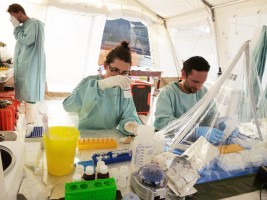Yesterday an expert committee convened by the World Health Organization
released a statement about the ethics of making experimental treatments for Ebola available to patients during the current West African outbreak. The panel unanimously concluded that it was, in fact, ethical for such treatments, which so far have never been shown to be effective, to be made available to patients given the existing circumstances and when particular conditions, for example informed consent and freedom of choice, are met. In essence: it would be unethical to withhold these treatments to wait for the rigorous randomized controlled trials that are typically done to establish effectiveness.

Due to many factors, there are currently no effective treatments approved for the treatment Ebola, nor any vaccine for its prevention. First, the actual number of people who have been infected by Ebola is small (a few thousand cases over 30 years), the people who get Ebola are poor and remote, and until recently most epidemics have been relatively easy to contain using existing surveillance and infection control.
Despite this,
a number of “experimental” treatments are in various stages of development. The typical development cycle for new drugs involves multiple phases of evaluation in order to establish safety, efficacy, and ideally effectiveness of these new treatments in humans and in real world settings where these medicines are likely to be used. None of the treatments that are currently in development have undergone rigorous evaluation studies to establish if any of these treatments are effective. Until the most recent outbreak, there has also been another challenge to the development of a new Ebola treatment: in the time it would take to set up a proper study to test the effectiveness of treatment, infection control measures are so effective and Ebola itself so lethal, that localized epidemics have usually died out.
The current West African outbreak appears to be different: Ebola outbreaks were previously unknown in West Africa, the health systems in affected countries are particularly weak, national governments are particularly limited in their ability to respond, and the international response has been inadequate. Enough bad circumstances have been blowing enough wind to keep the embers of this epidemic burning, perhaps since as early as last December.
Two weeks ago we learned that two American health workers working in Liberia had contracted the virus, were extremely ill, and were being airlifted back to the US for treatment. But prior to their departure, they somehow were administered doses of highly experimental serum. A Spanish priest, the only other non-African to have also have contracted the virus, also received the treatment raising many eyebrows since among the thousands of people infected with the virus, only the white patients had received the treatment.
Images of Dr. Kent Brantly walking out of the ambulance and into a hospital in Atlanta, just days after receiving his doses of the experimental serum had many suggesting that these treatments were miraculous. Given that both Americans back in the US appear to be recovering has led many to suggest that these treatments are in fact effective. But before we jump to this conclusion, we must also consider the selection effects of who received the treatment and who did not. The Americans were of much higher socio-economically status than most of the Africans who contracted the disease, and all likely had better access to health care. In particular, since both Americans had been heroically treating patients with Ebola for months they would have easily recognized the symptoms would have been spotted and treated early. Yesterday we learned that the Spanish priest who also received the treatment died of Ebola in Spain. Our estimates of the effectiveness of this miracle drug just dropped from 100% to 67%.
The reason randomized controlled trials remain the gold standard in the evaluation of the effectiveness of new medicines is due precisely to the types of selection issues I describe above. The downside of randomized controlled trials is that to do them well, it takes time and, by definition, some ability to control who gets treatment and who does not. It has been suggested that waiting for the results from such studies is unethical when treatments may be available to save lives today. But why do these things need to be mutually exclusive?
There has never been such an opportune time to test the effectiveness of the treatments for Ebola due to the large number of patients with the disease. The WHO panel also acknowledged this in their statement; it would also be unethical to miss the opportunity to learn about the effectiveness of these studies during the current outbreak. Given that the experimental treatments are in such short supply, tough decisions will need to be made about who gets treatment and who does not. But if countries adopted some of the elements of RCTs into the scale-up plans, it might actually be possible to scale up treatment in a way that is both ethical and likely to generate the greatest amount of new evidence on the effectiveness of the treatments.
For example, we could randomly allocate treatments across the various treatment sites. And within treatment sites, a list of all patients in need of treatment could be drawn up and patients selected at random for treatment within the list. If well done well, neither of these strategies are likely to slow down the rollout process, cost significantly more money, nor necessarily be less fair than other methods of allocating limited resources. In the long run, these types of strategies might help to shed light on the effectiveness of treatments, which could make the ethical debates less challenging in the future.
Experimenting with human lives will always raise important ethical dilemmas. But in the absence of good evidence about effectiveness, these decisions are even more ethically challenging. Generating rigorous evidence should therefore not be seen as being at odds with doing what is right, but rather the right way to learn about what is right.

